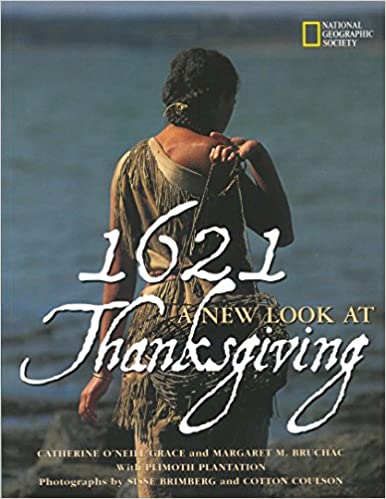In December of 1621, colonist Edward Winslow wrote a letter that briefly described the year’s harvest. In 1622, this letter was included in a publication
describing the beginnings of the new English plantation at Plymouth.
Winslow wrote: “Our harvest being gotten in, our governor sent four men on fowling, that so we might after a special manner rejoice together after we had
gathered the fruits of our labors. They four in one day killed as much fowl as, with a little help beside, served the company almost a week. At which time, amongst other recreations, we exercised our arms, many of the Indians coming amongst us, and
among the rest their greatest king, Massasoit, with some ninety men, whom for three days we entertained and feasted, and they went out and killed five deer, which they brought to the plantation and bestowed on our governor, and upon the captain and others. And although it be not always so plentiful as it was at this time with us, yet by the goodness of God, we are so far from want that we often wish you partakers of our plenty.”
Over time, Winslow’s account of the harvest event has become the basis for the myth of the First Thanksgiving. What actually happened during the three
days that English colonists and Wampanoag people met and ate together? First, let’s look at some of the events leading up to it.
Tisquantum had been living with the English for almost six months, teaching them how to grow corn and use fish to fertilize their fields. He and Hobbamock acted as translators and go-betweens for Massasoit.
In early summer, William Bradford sent Edward Winslow and Stephen Hopkins to Pokanoket, the Wampanoag village where Massasoit lived. Tisquantum accompanied them. They brought gifts to Massasoit and, as was customary, they also paid him honor by shooting their muskets in a salute. One of the gifts Bradford sent was a copper chain. Winslow explained that in the future any Native who came to Plymouth carrying the chain would be greeted and entertained as a special messenger from Massasoit.
On the autumn day Winslow described in his letter, when Governor Bradford sent four men to hunt wildfowl, the Wampanoag in the area no doubt heard the shooting. When the Englishmen started marching and firing their muskets in unison, the noise got even louder. It is likely that nearby Native people
felt that Massasoit should be informed. Perhaps Massasoit wondered if the English were preparing for war. We may never know but the fact that he showed up with 90 men, and apparently no women, shows he was being cautious. When it became clear to all that the English were celebrating, Massasoit sent some of his men out to hunt deer for meat to contribute to the feast. Once it was seen to be safe, it is likely that Native women and children, particularly Hobbamock’s
family, joined them.
For three days, the English and the Native people met
and ate together. In English style, Massasoit and his advisers probably ate with the leading men of the colony at a “high table” which featured the best food. Tables were probably set both indoors and outdoors for the other diners. Men, women, and children all helped in getting and preparing the food. This work included butchering the deer, grinding corn, plucking birds, gathering shellfish, roasting meat, and preparing whatever else was at hand.
Other “entertainments” took place, which probably
included playing ball, competitive sports, singing, music, and perhaps even dancing. The Wampanoag were especially fond of games of chance. If the English and Wampanoag children played together, they probably played games known to both cultures, such as blind man’s bluff, where a blindfolded “hunter” tries to catch another player, or the ring-and-pin game, where the object is to loop a ring over the pin. The English men took part in “exercising of arms,” military drills that involved marching and musket shooting.
Comprehension Questions
1. Who is Massasoit?
A. The English governor
B. The Wampanoag's greatest king
C. A Native warrior
A. Because he thought the Englishmen were preparing to attack them
B. Because he thought that the Englishmen needed help hunting deer
C. It is not known for sure
Your Thoughts
Vocabulary
4. List any vocabulary words below.

